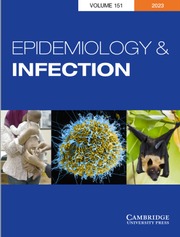Article contents
Resistance of Escherichia coli in faeces and the use of antimicrobial agents in the treatment of hospital patients
Published online by Cambridge University Press: 19 October 2009
Summary
Resistance of faecal Escherichia coli to ampicillin, tetracycline, sulphamethoxazole and gentamicin was studied in patients admitted to seven different departments in two hospitals. The resistance to ampicillin, tetracycline and sulphamethoxazole in the seven patient groups was 27–57%, 26–56% and 35–63%, respectively. Resistance to gentamicin was found in only one department. An E. coli flora predominantly resistant to ampicillin, tetracycline or sulphamethoxazole (> 50% of the E. coli strains in a faecal sample resistant) was found in 10–38%, 4–30% and 21–35% of the samples. A cross-sectional study focusing on the influence of the use of antimicrobial agents on the occurrence of resistant strains revealed a positive correlation between the annual turnover of broad-spectrum penicillins in various departments and the occurrence of predominantly ampicillin-resistant E. coli strains in these departments.
- Type
- Research Article
- Information
- Copyright
- Copyright © Cambridge University Press 1983
References
REFERENCES
- 1
- Cited by


